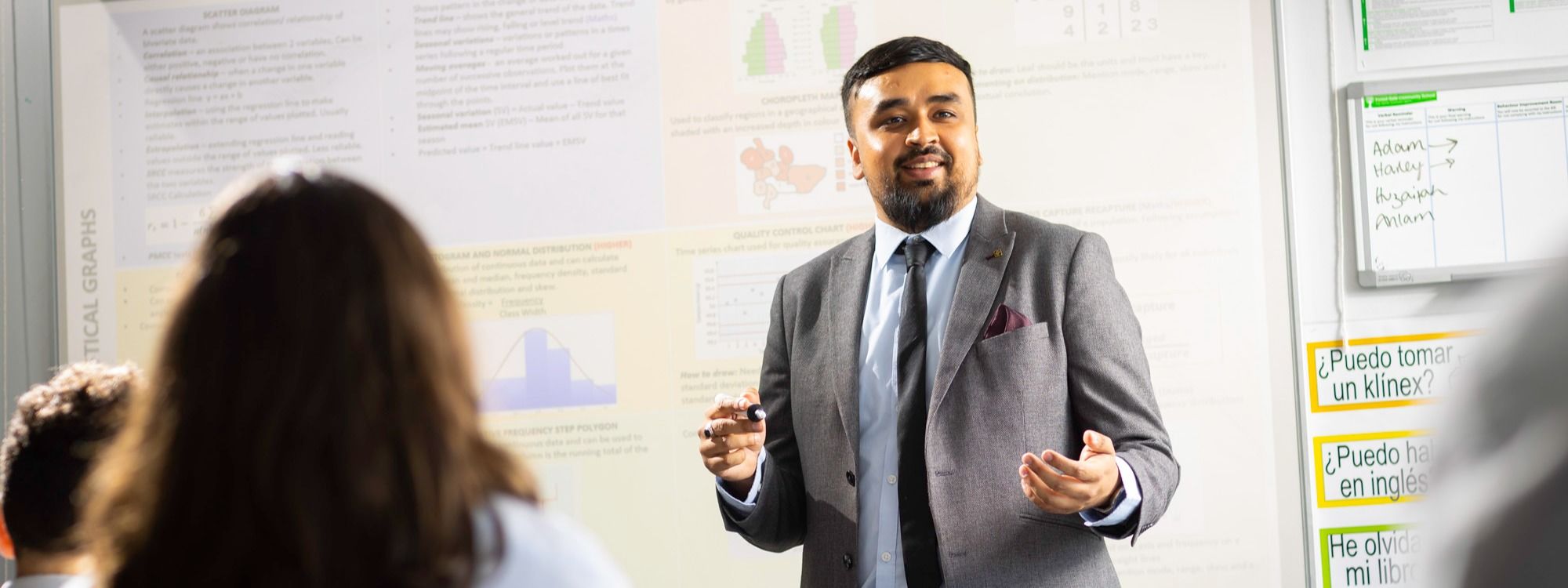- Home
- School
- Departments
- Science
Science
BackScience-at-FGCS-1.pdfWhat topics will my child study in year 7 & 8?
Students acquire scientific investigation skills such as: planning an experiment, naming scientific variables, drawing graphs and using scientific equipment safely.
In addition to the above, students in Year 7 & 8 study parts of following topics:
Biology:
- Cell biology
- Organisation
- Infection & response
- Bioenergetics
- Homeostasis
- Inheritance & Evolution
- Ecology
Chemistry:
- Atomic structure & Periodic table
- Bonding
- Quantitative chemistry
- Chemical changes
- Energy changes
- Rate of reactions
- Organic chemistry
- Chemical analysis
- Chemistry of the atmosphere
- Using resources
Physics:
- Energy
- Electricity
- Particle model of matter
- Atomic structure
- Forces
- Waves
- Magnetism & Electromagnetism
Topics covered in Year 7 & 8 are revisited throughout our year 9 - 11 curriculum. The full details of the specifications can be found below.
What topics will my child study in year 9, 10 and 11?
Combined science students follow Combined Science: Trilogy GCSE (9 - 1) AQA.
Details of this specification can be found at:
http://www.aqa.org.uk/subjects/science/gcse/combined-science-trilogy-8464
Separate science students follow GCSE AQA Biology, Chemistry and Physics.
Details of these specification can be found at:
http://www.aqa.org.uk/subjects/science/gcse/biology-8461 http://www.aqa.org.uk/subjects/science/gcse/chemistry-8462 http://www.aqa.org.uk/subjects/science/gcse/physics-8463
Do you have a reading list for this subject?
â—Â CGP New grade (9-1) GCSE Science: AQA Revision Guide
â—Â Collins AQA GCSE (9-1) Science: Biology, Chemistry and Physics
How can I help my child to excel in this subject?
In addition to discussing learning with your child and monitoring their homework, encourage your child to watch science programmes, documentaries and keep abreast of the latest scientific discoveries.
Taking your child to interesting places, such as; the natural history museum or the science museum will provide them with the broader knowledge they need to excel in the curriculum.
Are there any online resources?
https://senecalearning.com/en-GB/
https://www.freesciencelessons.co.uk/
https://www.youtube.com/@Cognitoedu
https://www.bbc.co.uk/bitesize/levels/z98jmp3
Do you offer any interventions or clubs my child can attend?
- P2X club for year 7-10s from 3:30-4:30 every Thursday
- Science club for Y7-10s running at lunchtime to promote Scientific enquiry
- Excellence lectures for Year 11s from 7:45am-8:15am every Friday
- Year 11 intervention on Tuesday to maximise examination performance
- Year 11 lunchtime intervention to maximise examination performance
Are there any important dates for me to be aware of in your subject?
Information will be provided of dates for interim assessments, internal and external examinations.
How will my child be assessed at the end of the course?
Combined science students sit:
Biology 1: written examination: 1 hour and 15 minutes. 33.3% of GCSE one.
Chemistry 1: written examination: 1 hour and 15 minutes. 33.3% of GCSE one.
Physics 1: written examination: 1 hour and 15 minutes. 33.3% of GCSE one.
Biology 2: written examination: 1 hour and 15 minutes. 33.3% of GCSE one.
Chemistry 2: written examination: 1 hour and 15 minutes. 33.3% of GCSE one.
Physics 2: written examination: 1 hour and 15 minutes. 33.3% of GCSE one.
Separate (Triple) science students sit:
Biology 1: written examination: 1 hour and 45 minutes. 50% of GCSE one.
Chemistry 1: written examination: 1 hour and 45 minutes. 50% of GCSE two.
Physics 1: written examination: 1 hour and 45 minutes. 50% of GCSE three.
Biology 2: written examination: 1 hour and 45 minutes. 50% of GCSE one.
Chemistry 2: written examination: 1 hour and 45 minutes. 50% of GCSE two.
Physics 2: written examination: 1 hour and 45 minutes. 50% of GCSE three.

